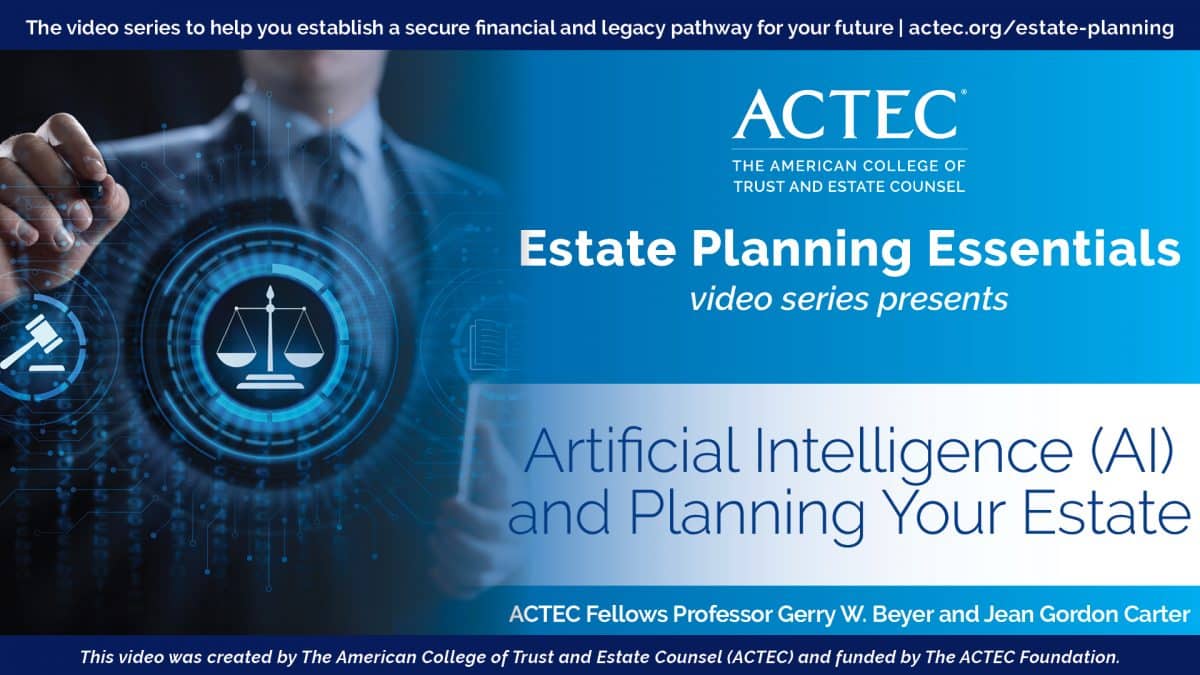There are positive and negative effects when using Artificial intelligence, (AI), to create an estate plan. Using AI to create an estate plan may seem appealing due to its cost-effectiveness and convenience. However, relying solely on AI to create estate planning documents can lead to significant issues. AI lacks the ability to think critically, may provide inaccurate information, and often overlooks crucial personalized details necessary for a comprehensive estate plan. Additionally, there are concerns regarding confidentiality and privacy when using AI for estate planning purposes.
ACTEC Fellows Professor Gerry W. Beyer and Natalie M. Perry explain the pros and cons of using AI when planning your estate and why consulting with an estate planning attorney is recommended to ensure accurate legal documents and tailored solutions.
Transcript
I’m Natalie Perry, ACTEC Fellow from Chicago, Illinois, and I’m here today with Professor Gerry Beyer, ACTEC Fellow from Lubbock, Texas. We are going to expand on our earlier video, which was an introduction to using AI, Artificial Intelligence (AI) and Planning Your Estate, and Gerry’s going to tell us about using AI to draft an estate plan.
Using AI to Create an Estate Plan
So, Gerry, tell us what you mean by AI and how AI impacts actually making my estate plan.
Professor Gerry Beyer: Natalie, the increased interest in artificial intelligence lately is based on the wide public availability of what is called limited memory or generative AI. Common examples that are available to everybody at no cost are ChatGPT and Gemini, which was formerly called Bard.
Now, these are highly sophisticated computer algorithms that are trained on billions- and yes, I do mean billions with a B- data points. This information comes from information that is fed into the AI by the programmers, that is, the data that trains the AI. And then many AIs often obtain new information by getting online, accessing the internet, and then scraping data from the internet and including it in its database.
Natalie Perry: What could I use AI for with respect to my estate plan?
Using AI to Research Estate Planning Topics or Draft Your Will
Professor Gerry Beyer: There are two main things you could use AI to help you with. First, you can ask AI questions about estate planning, basically using the AI as a research tool. Second, you can have the AI help you draft your will, powers of attorney, and other estate planning documents.
Natalie Perry: OK, so I can use AI to help me with the research and drafting aspect, right?
Professor Gerry Beyer: Yes.
Natalie Perry: So why shouldn’t I use AI? Because it would seem like AI is a lot less expensive than hiring an attorney.
Using Artificial Intelligence Instead of Hiring an Attorney
Professor Gerry Beyer: Well, you’re right, Natalie. You could use it, but I certainly don’t recommend it. And there are three main reasons for that. Let’s start with number one.
The AIs don’t think or analyze. You have to remember that the current AIs are limited memory or generative AIs. They are not sentient. They do not think. They do not analyze. They’re just trained on those billions of parameters. And they respond by using that data to generate a response using sophisticated algorithms. In other words, all they’re doing is guessing what word follows the word before it. It’s just an eight-ball or Ouija Board on steroids.
Now, second, AIs hallucinate. Now, I know they’re not human, but we still kind of refer to them with human characteristics. No different than you refer to your dog with human characteristics. And AIs hallucinate, meaning they make very authoritative statements that are totally made up of whole cloth.
Let’s look at a couple of recent examples. There was a New York lawyer. He used ChatGPT to find case law to support his case. ChatGPT gave him case names, citations, and quotes which were very favorable to his position, which he then included in the briefs he submitted to the court. However, it turned out that none of the cases, citations, or quotes actually existed and he and his firm were sanctioned for $5,000. And if that’s not bad enough, just a few weeks ago, a U.S. district court suspended a Florida attorney for one year from the practice of law for filing pleadings that contained AI-fabricated cases.
Now, were those unique examples or common? Well, I decided I had to run my own tests with ChatGPT and Gemini. Well, first, I asked them some questions. And sometimes, they came up with pretty good answers but way too often, they returned inaccurate responses, ranging from minor misstatements to responses that had no connection to reality, creating statutory and judicial decisions and rules and laws that did not exist. But when you read the response, it sounded really authoritative. So, from this, I learned you cannot rely on the AIs to give you accurate answers to your estate planning questions.
And third, the AIs don’t handle all the issues they need to when drafting. I did a study where I gave various AIs a very simple fact pattern and asked the AI to prepare a will. Now, some parts of the documents were pretty good. But overall, not acceptable. They missed many, many issues.
For example, they may have correctly indicated where the user wanted an asset to go upon death, but they didn’t consider what would happen if the asset was no longer in your estate or if the beneficiary died first. And they don’t consider all the personal details about your family members, which may impact exactly how you want your property handled. Maybe you have minor children or grandchildren. Maybe some have special needs. Maybe some are good at handling money, and others are not. In other words, the documents you get from the AI are not sufficiently customized and individualized to your needs, even if they meet the legal requirements to be a valid will. And failure to consider these issues, which an estate attorney would bring to your attention, can cause additional expenses after you pass and cause your intent not to be carried out.
Natalie Perry: It sounds like there’s a lot of problems with using AI. Is that everything?
Concerns Regarding Confidentiality and Privacy When Using AI
Professor Gerry Beyer: No, Natalie, that’s not it. There’s another big problem dealing with confidentiality and privacy. Because when you enter information into the AI, all the prompts, all the family information you need, names, addresses, phone numbers, whatever you put in, it now becomes part of the database, which the AI knows. And then when it responds to questions from other people, it knows all this stuff about you, which it can use to answer other people’s questions and draft their documents. So you’ve lost a huge amount of your confidentiality and privacy by using these AIs.
Natalie Perry: Well, that’s very frightening. Thank you. This has been really informative. Do you have any final thoughts before we wrap up?
Caution When Using AI in Estate Planning
Professor Gerry Beyer: I sure do, Natalie. I know many of our listeners are going to be tempted to use AIs to answer estate planning questions and maybe draft documents because of the convenience and low cost. And I understand that. However, doing so is likely to be very short-sighted. You may get misinformation and you may get documents, even if they’re valid, that will not carry out your intent. And in my opinion, that risk is just not worth it. So, instead, I recommend that you consult an attorney with estate planning expertise to make sure you get accurate answers and that your estate planning needs are properly carried out.
Natalie Perry: Thank you, Gerry. That was very informative. We appreciate you being here.
Featured Video
Artificial Intelligence (AI) and Planning Your Estate
Estate planning attorneys explain what consumers should be aware of when using AI and what their lawyer’s professional responsibilities should include.
ACTEC Estate Planning Essentials

ACTEC Fellows provide answers to frequently asked trust and estate planning questions in this video series.



